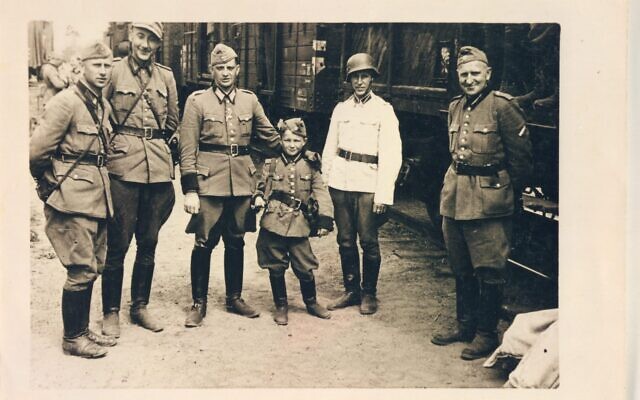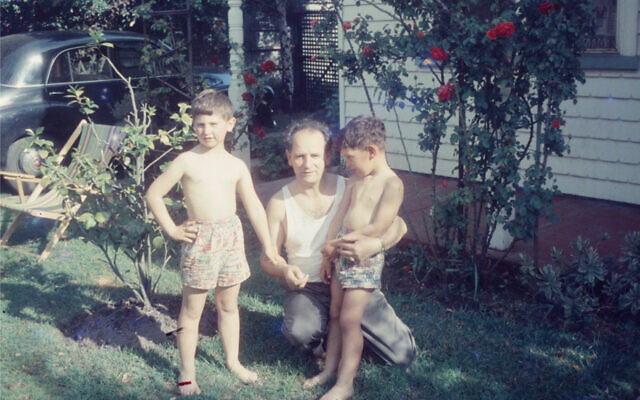Eddie Tamir sits in the Classic Cinema as he chats to The AJN about this year’s Jewish International Film Festival (JIFF) program which is jam-packed with blockbuster hits, hilarious television series, serious documentaries and excellent Australian-produced films. As he talks, he takes his laptop around the foyer of the Classic, showcasing the exhibition of Yiddish culture and theatre in Melbourne.
“The Classic, especially Cinema One, which is just behind me, was the home of Yiddish theatre,” he explained. “They used to do live shows here. And we have a permanent exhibition of Yiddish culture in the corridor which has handbills from prewar Yiddish theatre productions as well as Melbourne Yiddish culture.”
It seems especially fitting to talk about Yiddish culture this year, as the program is “soaked in Yiddish culture”, as Tamir shares in his program welcome.
This includes the film SHTTL, which was filmed in what is now occupied Ukraine, on the cusp of the invasion last year. SHTTL, is one of the big films for JIFF 2023. It is written and directed by Ady Walter and tells the story of a Jewish village in Ukraine 24 hours before Nazi Germany invades the Soviet Union. A full village, including 25 buildings and historical artefacts from all over Ukraine, was constructed about 60 kilometres from Kyiv. It was filmed in one take.
The critical response to the breathtaking film has been overwhelmingly positive. Premiering at the London Film Festival, SHTTL won the Audience Award at the Rome Film Festival. Interesting fact: according to Walter, the dropped ‘e’ in ‘shtetl’ is a reference to La Disparition, a novel by Georges Perec, which doesn’t contain the letter “E”. Perec’s mother died in Auschwitz. “Its absence marks a hollow, an empty space, a vertigo, a gaping hole. Shttl, my film, pays homage by leaving out the same letter,” Walter told Deadline.
In Melbourne, there’s a whole retrospective dedicated to Isaac Bashevis Singer.
Tamir also spoke to The AJN about the importance of showcasing locally produced films. The Jewish Nazi? directed by Dan Goldberg closes the festival.
“The Australian element is just so exciting this year, and for me, it’s the big story of the festival, because it’s so rare to get Australian films, which in this case are genuinely world premieres,” Tamir said. “That whole sense that JIFF is a place that is desired for filmmakers of Jewish film to premiere them, having their world premiere at JIFF is a great acknowledgement of everyone involved from our team to the public, to our audience, to the media that covers us and supports us. It makes it worthwhile for a film like Revenge and a film like The Jewish Nazi? to choose JIFF because they could have gone to many other festivals.”

The Jewish Nazi? tells the story of Melbourne’s Alex Kurzen, who survived the massacre of his shtetl in Belarus only to be captured by a Latvian battalion who made him their child mascot, Hitler’s youngest solder. The film tracks Kurzen’s journey to Sydney and then onto Melbourne, where after 50 years of keeping his secret, he decided to figure out his real identity.
The other major Australian feature is Revenge: Our Dad the Nazi Killer, directed by Danny Ben-Moshe. Revenge – a thrilling documentary – follows three brothers who stumble upon a family secret and vow to uncover the truth about their father, who allegedly travelled to Sydney after the war to undertake a revenge killing against a Nazi.
Tamir also made sure to mention the shorts that will be showcased this year, including the two short films that received the JIFF Short Film Fund for 2023 – Mahjong & Mahashas and Stones – and Sasha’s Game, adapted from Anita Selzer’s book I am Sasha and directed by Lexee Gordoun.
“We’re at the coalface of Jewish filmmaking creativity, it’s a very exciting story for us and for this year’s festival. It feels like a convergence of the fruits of all the investment over the last decade or two,” Tamir said.

He explained that they almost opened and closed the festival with the two Australian feature-length documentaries – both of which were worthy of the spots – but ultimately chose to open with an Israeli film, a comedy, which bucks the trend of previous years.
“Both films are big docs,” he said. “But we’re closing with one, so we chose to open with something Israeli and something on the fun side.”
He’s referring to Matchmaking, which will be opening the festival and was the biggest box office film of the year in Israel.
“If you look back at our programs, our openings are usually high-quality dramas. Sometimes that suits an opening vibe,” Tamir explained, describing Matchmaking as a romantic comedy with a bit of an edge. “Other festivals usually open with a fun, lighter film. So, we decided to open that way as well this year – it’s great fun and a quality commercial film.”
As for the other features of note, Tamir made mention of the two Israeli series, which the JIFF team are hoping will appeal to a younger audience.
Calling Chanshi an “enormous coup” for JIFF, Tamir said the team has spent years negotiating on it. “It was important for us because we love it, but also because it’s all about that younger audience,” he said. “If anything is going to do it, it’s this kind of material.”
Tamir said the same thing of Less Than Kosher, which is a web series, much smaller and more under the radar than Chanshi but a pretty wild ride as well.
“Some of the really interesting elements of the program are the television series, and we’re really proud to present the premieres of those.”
In terms of high-quality feature films, Tamir made mention of The Compassionate Spy, which he described as a “companion piece” to the very successful Oppenheimer, and Munich 72 which covers some new declassified and eye-opening information about the West German and Israeli governments in the wake of the Munich Massacre at the 1972 Olympics.
And then, you have what Tamir referred to as “two of the strongest Holocaust films of the year” – Stella. A Life. and Filip. And finally The Goldman Case, which Tamir explained the JIFF team secured thanks to their trip to Cannes Film Festival earlier this year.
When The AJN asked Tamir how important the JIFF team’s presence in Cannes was, Tamir didn’t hesitate in saying a few of the films they secured wouldn’t have been possible without being on the ground. They viewed The Goldman Case, which opened the Director’s Fortnight in Cannes, with the director and a panel Q&A following. “You can’t do that on a laptop,” Tamir mused.
The JIFF team also struck up a conversation with the Israeli producer of the film Victory, which hasn’t even been released in Israel yet, and will enjoy its international premiere as part of JIFF.
“That conversation with a producer, on the streets of Cannes, led us to get this early link of the film,” Tamir recalled. “And yes, you can do it online and via phone but really, in the landscape of Cannes, it’s very exciting.”
Does Tamir think the energy around the Cannes screening with the talent there in the room will translate all the way over here in Australia? Tamir laughed in reply.
“Certain films do well at a festival, but when you bring it out to your territory and face the cold, hard reality of the day in competition with other films or other media, things can warp,” he admitted. But these ones, he thinks will make the move seamlessly. “I think in general, it does translate.”
With such an incredible line-up of films, documentaries, shorts and plenty of events around Australia to accompany them, the 2023 JIFF program definitely won’t disappoint, especially with films direct from huge film festivals such as Cannes.
So, as Tamir says in his welcome note in the program, “see you at the movies”.
For more information and to plan your screenings, visit jiff.com.au


comments